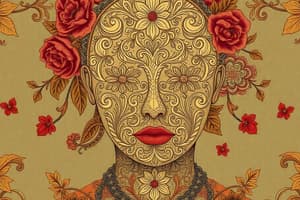Podcast
Questions and Answers
What aspect of the self does Descartes particularly emphasize?
What aspect of the self does Descartes particularly emphasize?
- The connection to external reality
- The biological nature of beings
- The influence of cultural norms
- The significance of consciousness (correct)
According to Freud, which component of the self operates under the pleasure principle?
According to Freud, which component of the self operates under the pleasure principle?
- The Consciousness
- The Ego
- The Id (correct)
- The Superego
What do Hindu philosophers equate Atman with in their understanding of the self?
What do Hindu philosophers equate Atman with in their understanding of the self?
- The material identity of individuals
- The moral guidance from cultural norms
- The Universal Principle behind all existence
- The true self that is identical with God (correct)
How does Hume describe the composition of the mind?
How does Hume describe the composition of the mind?
What role does the Ego play in Freud's theory of the self?
What role does the Ego play in Freud's theory of the self?
What is the primary aspect of self-knowledge?
What is the primary aspect of self-knowledge?
Which philosopher believed that understanding oneself is crucial to living a meaningful life?
Which philosopher believed that understanding oneself is crucial to living a meaningful life?
What does self-image primarily refer to?
What does self-image primarily refer to?
In Aristotle's view, what constitutes the essence of a living being?
In Aristotle's view, what constitutes the essence of a living being?
Self-independent focuses on which of the following attributes?
Self-independent focuses on which of the following attributes?
Flashcards are hidden until you start studying
Study Notes
The Concept of Self
- Self-knowledge refers to understanding one's own learning, character, motivations, and capabilities. This involves recognizing personal experiences, sensations, attitudes, and beliefs.
- Self-activity is the independent and self-determined action of an individual. It involves making decisions and carrying out actions based on personal thought, not external influence.
- Self-independence centers on the inner self, emphasizing individual attributes like abilities and natural intelligence. This fosters a sense of self-worth and contributes to goal achievement.
- Self-identity defines the unique characteristics that distinguish an individual from others. It encompasses recognizing one's potential and individuality.
- Self-image is a mental picture of oneself that influences perspectives on abilities, personality, and roles. It represents how individuals see and feel about themselves.
Western Philosophy of Self
- Socrates believed that understanding the self meant "knowing thyself," emphasizing the importance of self-awareness and aligning actions with one's true nature.
- Aristotle viewed the self as the soul, the core essence of a living being, inseparable from the body. He saw the soul as the form that gives life its unique qualities.
- Rene Descartes viewed consciousness as the foundation of the self, recognizing the observer-observed dynamic that shapes thinking and guides behavior.
- David Hume argued that the mind is a collection of perceptions and experiences connected by cause-and-effect and resemblance.
- John Locke believed that the self resides in consciousness, which encompasses thoughts and experiences. He equated the self with personal identity, shaped by reason and reflection.
Eastern Philosophy of Self
- Hindu Philosophy emphasizes the "Atman," the true self residing within human identities, believed to be identical to God. The concept of "Brahman" represents the universal principle and ultimate reality.
- Buddhist Philosophy focuses on understanding the nature of the self through the "Five Skandhas," which are form, sensation, perception, mental formation, and consciousness.
- Confucian Philosophy defines the adult self as an achieved state of moral excellence, emphasizing the development of character through upbringing and environment. It prioritizes personality formation over inherent existence.
Scientific Self
- Mitosis is a cell division process that results in two genetically identical diploid daughter cells. It is essential for growth, development, repair, and asexual reproduction.
- Meiosis is a cell division process that produces four genetically diverse haploid gametes (sex cells). It is essential for sexual reproduction.
- Sex Determination refers to the biological process that determines an individual's sex.
- Genetic Sex Determination is the most common method, where sex is determined by inherited chromosomes from parents.
The Biology of Sex
- During reproduction, both parents contribute an equal number of chromosomes, resulting in 23 pairs (46 total) in a typical individual.
Nature vs. Nurture
- Nature proponents argue that genetics influence behavior traits.
- Nurture proponents argue that human behavior is learned through social interactions and experiences.
Beauty and Appearance
- St. Augustine pondered the relationship between beauty and delight, questioning whether beauty is a source of delight or a consequence of it.
- Plato connected beauty to love and desire.
- Aristotle believed that order, symmetry, and definiteness were chief forms of beauty.
- David Hume believed that beauty is a subjective perception, not an inherent quality of objects.
- Francis Hutcheson believed that beauty is perceived through sight.
Body Image and Self-Esteem
- Body Image refers to the perception and feelings about one's own body.
- Appearance encompasses all visible aspects of a person, including how they present themselves to others.
- Self-Esteem represents the overall evaluation of one's self-worth and can significantly impact body image.
- Confidence is a belief in one's capabilities and can fluctuate depending on the situation.
Common Causes of Poor Body Image
- Emphasis on the thin ideal body.
- Bullying and peer pressure.
- Media influence.
Effects of Poor Body Image
- Body Dissatisfaction: Negative thoughts about one's own body.
- Depression: A mood disorder characterized by persistent sadness and loss of interest.
- Low Self-Esteem: Lack of confidence in oneself and one's abilities.
Eating Disorders
- Bulimia: An eating disorder characterized by binge eating followed by purging behaviors.
- Anorexia Nervosa: An eating disorder characterized by food restriction, body image disturbance, intense fear of gaining weight, and a strong desire to be thin.
Sexually Transmitted Infections (STIs)
- Chlamydia is a bacterial infection often asymptomatic, but if untreated, can lead to complications.
- Genital Warts are caused by HPV and are typically treatable.
- Gonorrhea is a bacterial infection that can cause serious health complications if left untreated.
- Hepatitis B is a viral liver infection preventable through vaccination.
- HIV weakens the immune system, increasing vulnerability to infections.
- HPV is the most common STI, often asymptomatic, but some types can cause cancer.
- Syphilis is a bacterial infection that can cause serious health complications if left untreated.
Studying That Suits You
Use AI to generate personalized quizzes and flashcards to suit your learning preferences.




